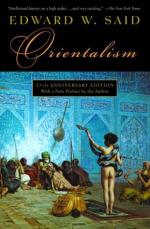
|
| Name: _________________________ | Period: ___________________ |
This test consists of 15 multiple choice questions and 5 short answer questions.
Multiple Choice Questions
1. When was L'Avenir de la Science written?
(a) 1798.
(b) 1848.
(c) 1865.
(d) 1812.
2. What are the four elements described by the author that established eighteenth century thought on the structures on which modern Orientalism depend?
(a) Suppresion, policy, reinvention, and institutionalism.
(b) Nobility, certainty, revision, and expansion.
(c) Empathy, education, information, and expression.
(d) Expansion, historical confrontation, sympathy, and classification.
3. Who called the spiritual and intellectual project of the eighteenth century a reconstituted theology or "natural supernaturalism" (114)?
(a) M. H. Abrams.
(b) Edward William Lane.
(c) Charles Wilkins.
(d) Henry Thomas Colebrooke.
4. Who wrote The Persians, which is the earliest Athenian play extant?
(a) Plato.
(b) Homer.
(c) Socrates.
(d) Aeschylus.
5. Who coined the phrase "les bourgeois conquerants"?
(a) Henry Thomas Colebrooke.
(b) Charles Wilkins.
(c) Edward William Lane.
(d) Charles Moraze.
6. What French philosopher is cited in Chapter 1 as having written an analysis on "the poetics of space" (54)?
(a) Gustave Dugat.
(b) Gaston Bachelard.
(c) Edgar Quinet.
(d) Claude Levi-Strauss.
7. When did the Second Boer War begin?
(a) 1901.
(b) 1859.
(c) 1899.
(d) 1895.
8. When was the Society for Promoting Christian Knowledge founded?
(a) 1789.
(b) 1823.
(c) 1804.
(d) 1698.
9. Who translated the Koran into English in 1734?
(a) Edward William Lane.
(b) George Sale.
(c) Charles Wilkins.
(d) Henry Thomas Colebrooke.
10. The author states in Chapter 1, "By and large, until the mid-eighteenth century Orientalists were" what (51)?
(a) "Philanthropists."
(b) "Philological scholars."
(c) "Anthropologists."
(d) "Biblical scholars."
11. When was the American Oriental Society founded?
(a) 1823.
(b) 1842.
(c) 1804.
(d) 1789.
12. How much money was Lord Cromer given on July 30, 1907 as a retirement prize for what he had done in Egypt?
(a) 20,000 pounds.
(b) 30,000 pounds.
(c) 100,000 pounds.
(d) 50,000 pounds.
13. Who gave an encyclopedic description of Orientalism in La Renaissance Orientale between 1765 and 1850?
(a) Claude Levi-Strauss.
(b) Gustave Dugat.
(c) Edgar Quinet.
(d) Raymond Schwab.
14. When was the Societe Asiatique founded?
(a) 1822.
(b) 1829.
(c) 1804.
(d) 1789.
15. When was Uber die Sprache und Weishelt der Indier published?
(a) 1859.
(b) 1789.
(c) 1808.
(d) 1823.
Short Answer Questions
1. When was Abraham-Hyacinthe Anquetil-Duperron born?
2. When was William Whiston expelled from Cambridge for his Islamic enthusiasm?
3. When was Ernest Renan born?
4. Who invented for himself the name of "stud. philol." in 1777 (131)?
5. Who wrote The Citizen of the World?
|
This section contains 315 words (approx. 2 pages at 300 words per page) |

|




